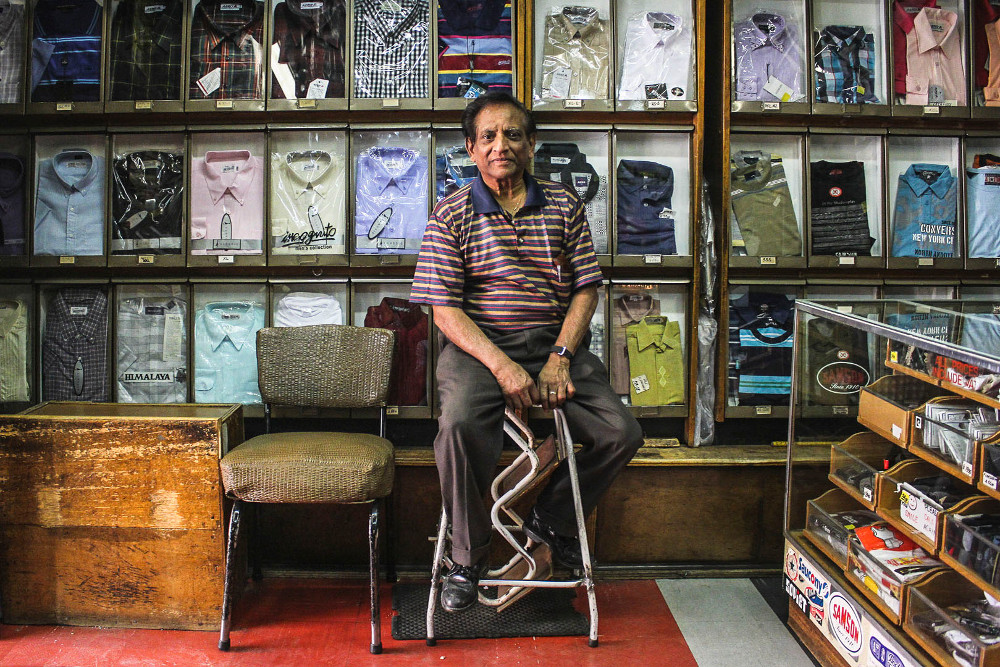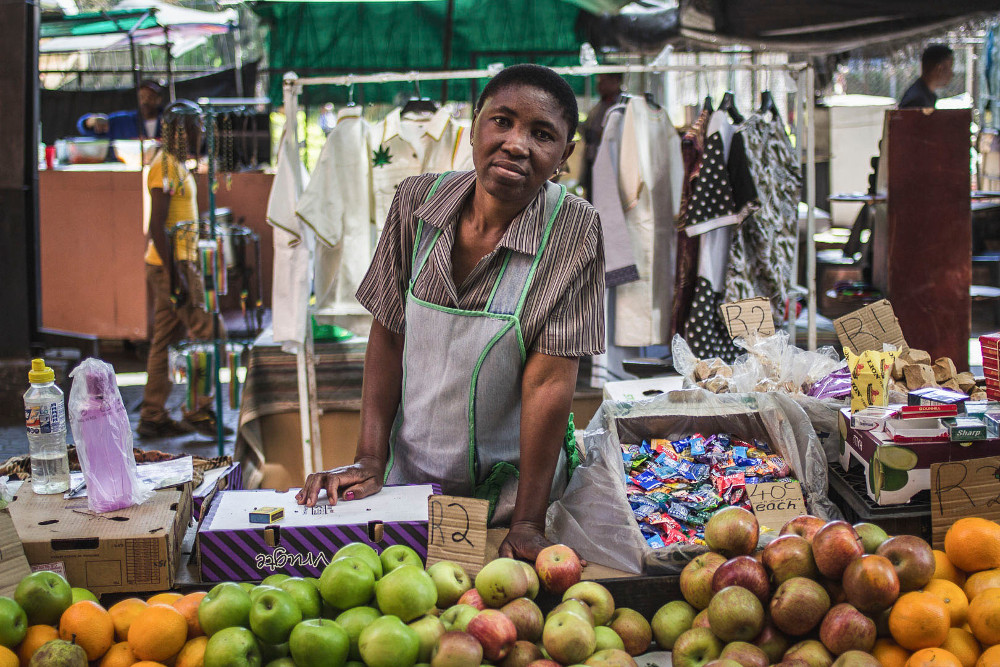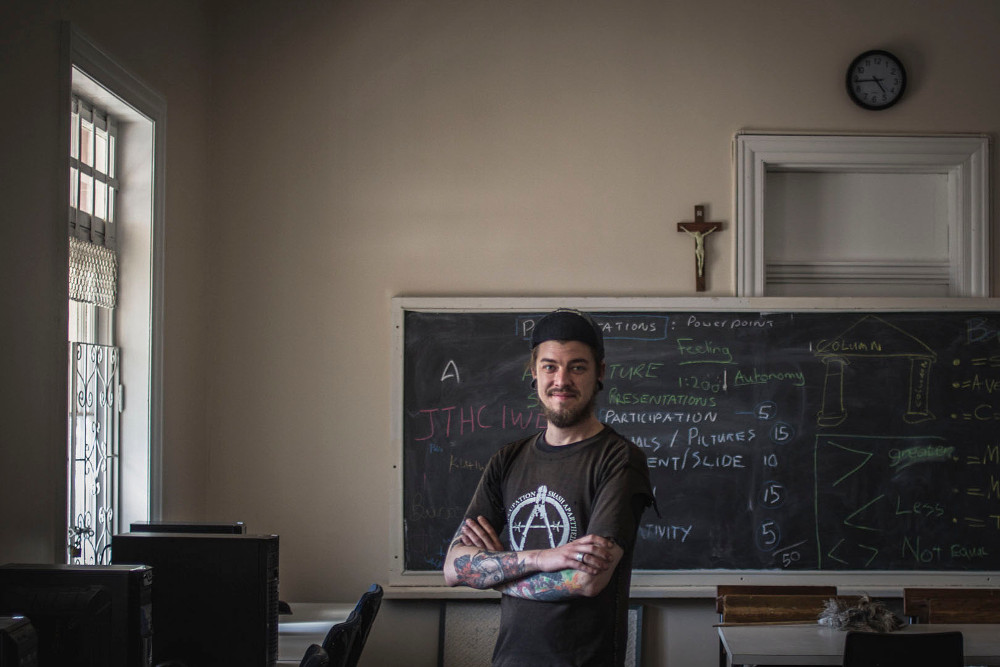The International Trade Union Confederation estimates that nine in 10 workers in Africa have informal work.
It’s mid-morning at a construction site in Rosebank. It is one of several sites in this Johannesburg suburb, where upmarket apartment complexes and square, clinical-looking hotels will soon replace ageing blocks of flats and houses.
Around every corner there are men in blue overalls, climbing vast scaffolding, building and plastering.
It looks like progress, but it illustrates something different – precarious work is becoming the norm. Research indicates that the majority of these workers will not be permanently employed. Work, as we know it, has changed.
The International Labour Organisation, in a study of 180 countries, estimates that in 2015, stable, full-time employment represents fewer than one in four jobs.
In South Africa, between 25% and 50% of workers are estimated not to have permanent contracts. But the trend is global. About 90% of Chinese workers do not have permanent contracts. The organisation’s research also shows that so-called advanced economies, such as the United States and those in Europe, are showing the same trend – standard employment is less likely to be found.
“We’ve been saying this for 15 years,” says Jan Theron from the Institute of Development and Labour Law at the University of Cape Town.
There is no short answer to why permanent work is increasingly scarce but, Theron says, the restructuring of the workplace to the benefit of the top echelons of society has eroded the base of organised labour, the permanent worker.
Decreasing permanent work is part of “externalising accountability” for one’s employees, he says.
Johan Visser, general manager at Lenco Construction, oversees a construction site in Johannesburg. In the 1980s, Visser would have employed his own staff, including labourers. Now, he keeps a skeleton staff of 40 or 50 people and outsources the rest.
“We are just lucky to have work,” he says. The construction industry is heaving, work is scarcer for bosses, and increasingly precarious for ordinary workers.
Visser says this is why he, like others, uses subcontractors rather than directly employing workers.
He learned this lesson recently, when work that was expected did not materialise. Carrying the costs of full-time staff when the company had no contracts cost his company R4.5-million in one year.
Subcontractors employ artisans, bricklayers, plasterers, painters and tilers. These workers earn on average a minimum of R120 a day.
But there are subcontractors who pay their workers less, sometimes just R80 a day, in an economy where the transport costs of workers alone can amount to R50 a day.
None of these workers are on full-time contracts. Subcontractors can recruit them from anywhere.
Visser says his company requires that the subcontractors it uses provide the relevant documentation, including tax certificates and workers’ permits for those who come from outside the country.
But the world of subcontracting is murky, and rules are often broken.
“I know of subbies [subcontractors] who stand outside in the morning, take a thousand bucks out and say to the guys: ‘Divide this among yourselves.’?”
Then there are the “aslams [asylum seekers]”, a regular feature of the casual labour workforce. If a worker’s permit runs out while he’s under contract, Visser says he, the main contractor, “will be in deep shit – they will lock me up on-site”.
But the regulations do not stop subcontractors from turning a blind eye to this.
This kind of casualised labour creates an additional layer of legal distance between the employer and the employee.
The Casual Workers Advice Office in Johannesburg is a nonprofit organisation that provides support to workers in a precarious situation. It receives many casualised workers, most of whom are fed up with trade unions’ response to their plight.
The advice office’s Igshaan Schroeder says another form of casualisation is the use of labour brokers, which he calls a “fig leaf” for employers. He says there has been a strong sense of outrage from workers. Trade unions have rallied against labour broking for years, yet as insecure work proliferates, there is little sign that these efforts will bear fruit.
“In that case, the workers’ demands have been completely clear. They’re not reconciling to that form of labour. They are absolutely clear they should be employed by the client companies,” Schroeder says.
John* is a Mozambican who works on a construction site. The mangled index finger on his left hand contradicts his insistence that his job is not dangerous. He confesses that the counterweight from a lift on a construction site once landed on his hand. He pulls his hand back as he tells the story, a jerky reaction to the reminder of the pain.
In his current job, he earns about R6 000 a month. He has worked for the same contractor for six years; the job has never been permanent. His contract is renewed each year.
John is a case study in two trends. He was a mineworker at Impala Platinum before changing careers. He left when violent strikes made the environment unbearable for him.
It is increasingly rare for workers to stay in the same profession for their entire careers.
Research by the London Business School released in 2014 says this is especially true for people born in the 1980s and 1990s.
Second, John is part of a class of contract workers whose contracts are renewed at regular intervals.
John considers his work to be stable, even permanent, but it is not. Under the illusion that his job is not precarious, John does not question the nature or length of his contract.
The truth, however, is that his contract can be cancelled at the end of this very job, or the next, and he will have little recourse.
Schroeder says people like John work for the same company for years without the benefits that come with being a permanent, full-time worker.
Tshepo* has been a security guard for 12 years. Before that he was a hawker but ran out of money. He is part of another trend: low wages, even when work is permanent.
After 12 years of working 12-hour shifts, Tshepo confirms he earns a lot less than R12 000 a month. He is close to retirement age.
The numbers are sometimes disputed, but Statistics South Africa data suggests at least a fifth of South Africa’s workforce lives in poverty.
According to the International Trade Union Confederation’s (Ituc) 2015 Global Rights Index, South Africa, famed for its protection of workers’ rights, is slipping on that score. This year, South Africa was rated with Angola, Lesotho and Brazil, where there had been repeated workers’ rights violations.
Ituc estimates nine in 10 workers in Africa have informal work.
Schroeder says casual work is not recognised by South African labour law, yet workers are increasingly employed on a casual basis. There seems to be a sense of acceptance among many of these workers.
“This is partly because there’s a strong tradition of casual work in South Africa, and partly because the labour union movement hasn’t tried to organise these workers in any meaningful way,” says Schroeder.
These workers are invariably young, or immigrants, who are especially vulnerable.
UCT’s Theron says one option in combatting the lack of permanent work is a self-help response – the formation of workers’ co-operatives.
He says there are cases where workers organise themselves in this way and have managed to earn a livelihood equivalent to a sectoral determination. “It’s working for something which you control, under conditions which you control. You may not be able to pay annual leave because there might not be enough capital at any one time but you can be autonomous,” Theron says.
But government has moved to regulate co-operatives so heavily that they’re subject to the same standards as formal work. “With all the hoops you have to jump through, you are right back where you were,” he says.
Schroeder says there is no reason workers should accept anything less than permanent work. “It’s not that the nature of work has changed. Work doesn’t require more temporary workers. It is simply the bosses increasing their rates of exploitation … The workers’ response is rational: they do the same work as permanent workers. It’s part of a successful struggle waged by the capitalist classes and there’s no reason why workers should accept that.”

The businessperson
At 77, Chimlanlal Chhiba is a self-made businessperson, and owns one of the oldest clothing shops in Johannesburg.
Ramson’s Tailors and Outfitters in Newtown is 101 years old, and Chhiba has worked here for 60 years. He took over the business from his father, an Indian immigrant, who started the family business.
Everything here is old, from the wooden boxes housing ties and socks to the metal letterbox at the bottom of the old wooden doors.
He phased out the tailoring part of the business some time ago when he ran out of manpower: two of his brothers died, leaving just him and another brother in charge of things. Sometimes they hire extra pairs of hands at month-end. When times are better, they do this on weekends, too.
He points to the busy street outside and says he watched the businesses emerge over the years.
The secret to being a successful businessperson is hard work, 12 hours a day, “eight days a week”.
With a proud grin, Chhiba recalls the time when he fell and broke four ribs. “I was still in the shop. There’s not a day where you will find me absent,” he says.
He is a workaholic. “I don’t believe in holidays. I’m hyperactive. My children are the same way. I suppose that makes me a good worker.”

The informal trader
Phumutzo Mashamba (44) sells fruit in a makeshift stall in Braamfontein, Johannesburg. It’s a job she has had for six years. Before that, she was a security guard but gave it up to take over her mother’s fruit stall after her mother had a stroke.
With no formal qualifications, security was the only work she could find, and it was a job she had for a little over year. Before that, Mashamba had been unemployed.
The security work was better, she says. Now, there are too many stalls in Johannesburg and competition is tough. “Some days I sit here until 5pm and I don’t even have R100.”
She wouldn’t recommend this work to anyone.
In five years, Mashamba hopes to still have her stall because she has to make money, but she isn’t hopeful about her prospects. The more informal traders there are on the streets, the less money she makes.
Ideally, she would like to be doing “something I like”, such as helping people. “I want to be a social worker,” she says.

The teacher
Nathan Borthwick (31) is a high school teacher and grade head at the Holy Family College in Johannesburg. He has been a teacher for 10 years, with brief periods of travelling around Europe in between. He teaches history, social sciences and computer applications technology.
There can be hindrances to job satisfaction in teaching pedagogically, says Borthwick. But overall, it is a secure profession. Those who derive the most satisfaction from the profession are “people who take teaching seriously in terms of unleashing the potential of a child”.
But teaching is also a challenging job because educators are under pressure to produce results.
“You can’t give a child zero. I have to grab them and make them do the work. That child has to have a mark.”
The administrative duties teachers are responsible for, especially when they are promoted to management positions, can draw the focus away from teaching, he says.
He would like to venture into tertiary education, something he says many teachers aspire to. But this requires them to master their subjects – in Borthwick’s case, history.
Tertiary education means less interaction with children, interactions that come from simple things such as taking walks around the school premises with his wife, Leonie, and their dog, Tolstoy, and mixing with children. But there’s nothing quite like having a “moment” with a pupil in class. “When you have ‘wow’ moments with children, it can be very exciting.”

The taxi driver
Abe Mtshali (58) had a stable job as a data capturer for a major company, until a company merger turned his life upside down.
He had worked his way up the ranks to head his own division but, because of the merger, there were two people to fill one position. He fell out of favour with his supervisor and got the chop.
It was hard to find work again. For years, Mtshali had captured the data of clients in hard paper files. “The world was changing to computers. It was hard to compete with the youngsters.”
Out of work and in a market that needed skills he didn’t have, Mtshali had little option but to choose a new career.
He bought a van and tried to become a courier. But the courier companies he applied to sent him on wild goose chases and little work followed.
He turned to taxi driving.
It hasn’t been easy, and he isn’t sure if he will have work in five years’ time.
“Some days you get lucky and there are customers. Sometimes you wait for hours, and nothing happens. Some of the guys say things are going to get better, but I don’t know.”

The florist
Charles Mkhonza (42) has been a florist all his life. He is an anomaly – he has been in the same job, his first, since 1990. He has been offered jobs by other florists, but his relationship with his employer is what keeps him at Dunkeld Fruit and Flowers in Johannesburg.
He enthuses about his work. “The best part of my job is meeting different types of customers. The worst part is seeing a customer walk out unhappy.”
The most important thing when putting together a bouquet is the person’s age. “I try to match the flowers to the customer’s age.
For example, for the elderly, I usually use bright colours, or indigenous flowers. Something summery and colourful.”
He was put on a permanent contract in 2000. “Before then, we didn’t really know about contracts.”
In five years’ time, Mkhonza hopes to be right where he is now. “Just enjoying my job.” – Additional reporting by Gloria Nakajubi, photographs by Jacques Nelles
* Names have been changed.